RSU "Researcher of the Year 2018" – Oskars Kalējs
The annual RSU award in the category Researcher of the Year was presented to RSU professor Oskars Kalējs from the Faculty of Medicine, Department of Internal Diseases, cardiologist at Pauls Stradiņš Clinical University Hospital. The award is recognition for his active involvement and contribution to the supervision of student research work and for the increasing interest of students in science.
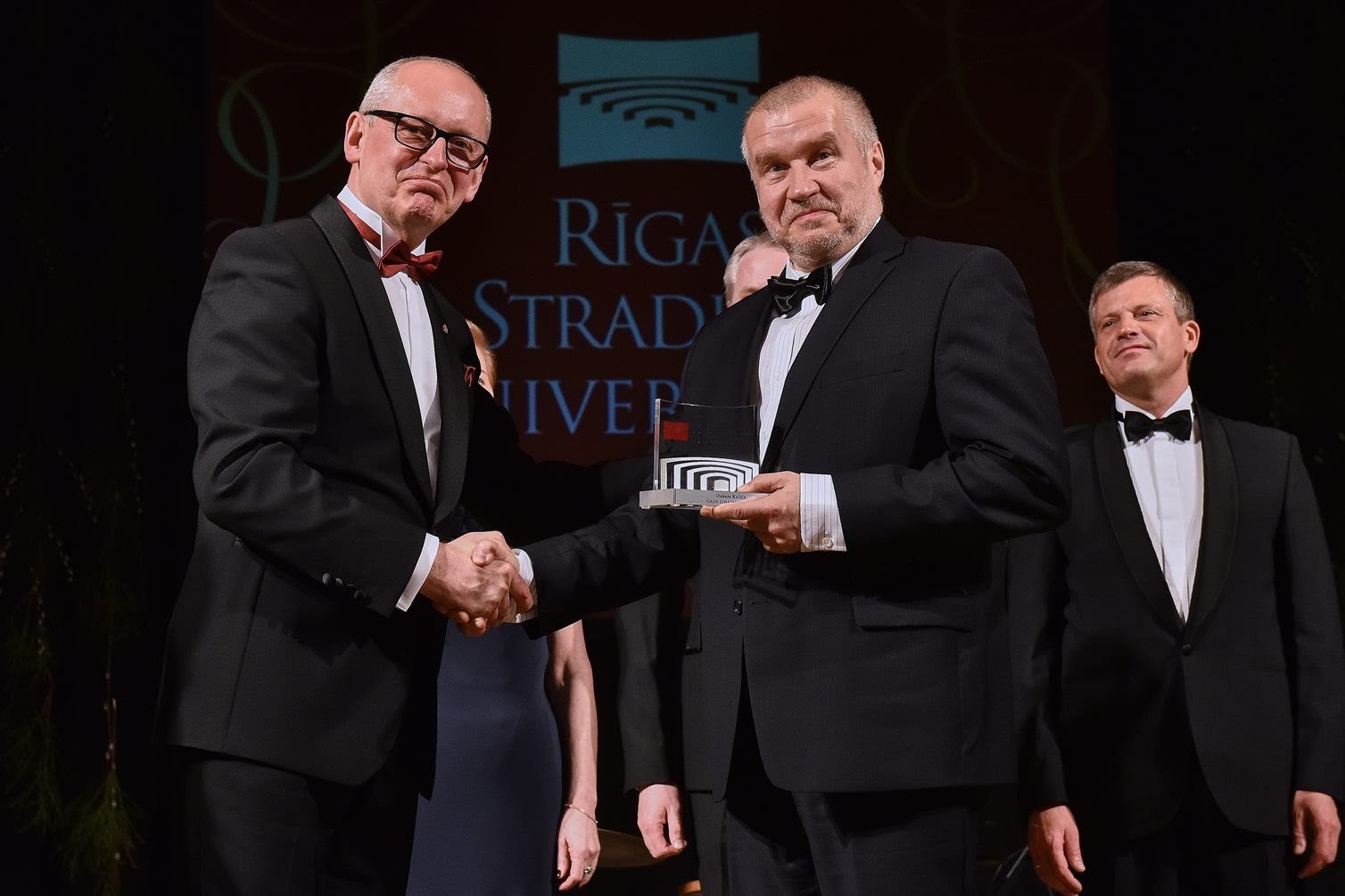
Prof. Oskars Kalējs (on the right) receives the award from RSU rector Professor Aigars Pētersons at the RSU Annual Awards Ceremony, RSU Academic Ball, Latvian Society House in Rīga, 24 March 2018
Professor Oskars Kalējs has supervised ten doctoral theses, two Master’s theses, five qualification papers and a number of student research projects e.g. at this year’s RSU international students' scientific conference Professor Kalējs had supervised the highest percentage of research projects presented.
Back in the day, when Oskars Kalējs was a student at Rīga Medical Institute (predecessor of RSU) in his second study year, he dived into research and became an active member of the students’ scientific society. He knew why he was studying medicine and what he wanted to achieve in this area as he enrolled at the university after graduating from Riga 2nd Medical School and while studying, he worked for the emergency services.
Students tend to applaud after Professor Kalējs' lectures as he frequently quotes Winnie the Pooh, refers to RSU as the Castle of Light and refers to electrocardiography as a letter to the doctor from the heart. He is rather pragmatic, yet at the same time an optimistic person who lives life to the fullest, happy to give friendly advice to everyone, “If you think that you are being insulted, humiliated or others are doing you wrong, then look in the mirror and start with yourself!"
I interviewed you four years ago when you were awarded the Person of the Year in Medical Education award! What has changed in your life since then?
The to-do list has only grown longer and I have concluded once again that 24 hours in a day are not enough. However, it is an incentive to plan one’s time even better as then it is possible to achieve much more. Hypothetically speaking though, I have considered living on Jupiter or Saturn, as the days there are much longer …
I appreciate that over the years RSU student activity, i.e. their research has gone international. Our students report on the outcomes of their research at international student conferences and congresses organised by professional associations, thus representing not only RSU but also Latvia. This is a significant step ahead!
Why do you supervise students' research work?
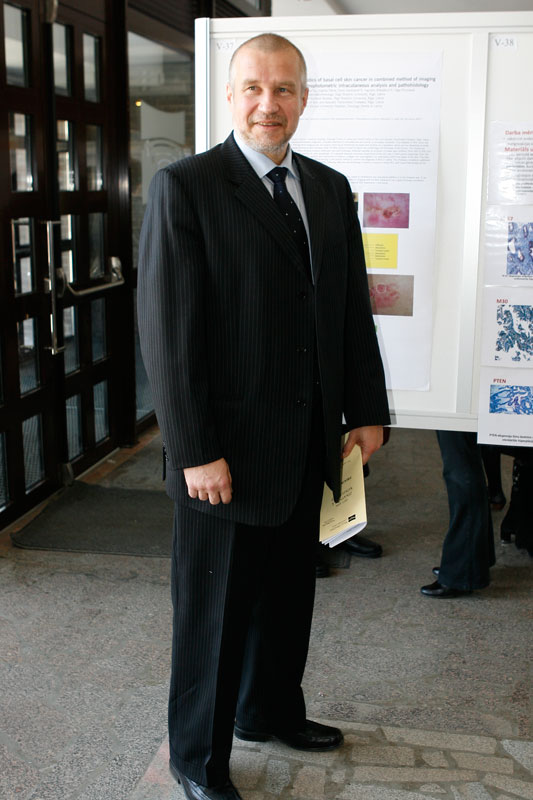 Firstly, because it is interesting. It is interesting to me because it is interesting to my students. It is like the word play by Winnie the Pooh on snow: "The more it snows (Tiddely-Pom). The more it goes (Tiddely-Pom)! On snowing.” According to this philosophy, students are interested, they want something and it is a brilliant moment when the student gets inspired by what they see in clinical medicine. If they are inspired, interested and come with a desire, a willingness to delve deeper. At this point my task is not only to give them the spade, but also to show them where and how to dig, without turning them into, say, merely a technical assistant or a writer, as it is important for the student to know how to dig creatively.
Firstly, because it is interesting. It is interesting to me because it is interesting to my students. It is like the word play by Winnie the Pooh on snow: "The more it snows (Tiddely-Pom). The more it goes (Tiddely-Pom)! On snowing.” According to this philosophy, students are interested, they want something and it is a brilliant moment when the student gets inspired by what they see in clinical medicine. If they are inspired, interested and come with a desire, a willingness to delve deeper. At this point my task is not only to give them the spade, but also to show them where and how to dig, without turning them into, say, merely a technical assistant or a writer, as it is important for the student to know how to dig creatively.
If a graduate already has a couple of indexed publications, if only as the second or the third co-author – that's very good, but as the first author – this is excellent!
Certainly, in most cases research is group work and is conducted together with others, because in medicine, one is not a lone warrior, although occasionally a great deal can be accomplished by oneself. I do not want to assert that absolutely everyone should be active in research and science within the basic meaning of this concept, knowing that each one of us is an individual, however, these activities sift out those who are interested in something more and who will be those able to independently organise research and set up research groups, and afterwards – teach others, as percentage of them will be academics in the future. This is how succession develops.
As you already mentioned, not everyone will become a scientist, but why should a prospective medical professional engage in research?
A student or a medical resident who has experience in delving into or getting deeply involved in something, as a rule, will not forget that a medical practitioner must read and stay informed on the latest developments in the field. It most certainly takes a lot of time – nevertheless, it is possible if one plans their time.
Is it an easy task to supervise student research?
If you want it to make sense for everyone, then no, it is not easy. The student approaches you, asks questions, then he comes back once more, asks additional questions, then he calls you, writes e-mails and SMS. Although, I would have never chosen to do this, if I were not prepared for this!
One should remember that the student always approaches you with good intentions and that in the future he may be part of your team and you will work together on an important project or publication.
Do you agree to supervise the thesis of all students who ask?
I tend to stick to some rules, as I want to have the work done properly. I usually evaluate the work and decide which one will be supervised by me and which should be directed to some of my colleagues, if the topic chosen by the student better suits and is of higher interest for some other colleague.
Do you gain anything from supervising the research work of students?
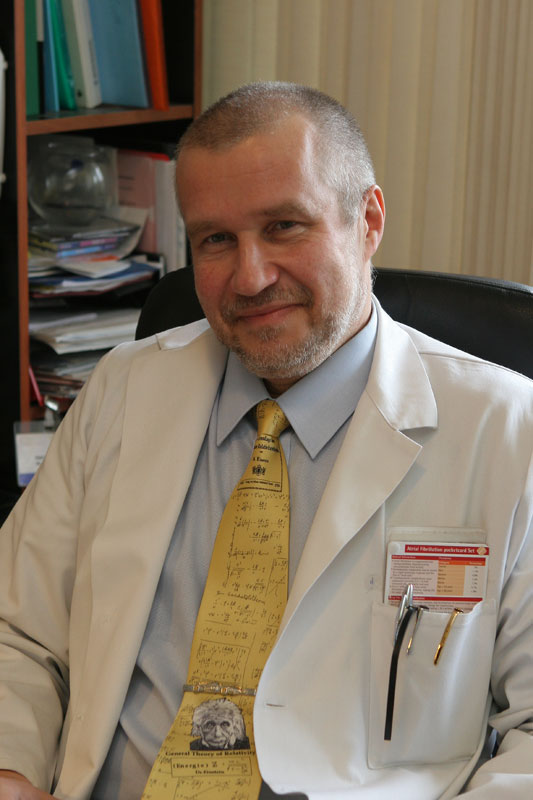 Yes, I certainly do! No student takes the standard approach. Medical practitioners with many years of experience seem to have blinkers on, whereas students, you might say, have a fresh perspective and when approaching some issue they can see the playing field more clearly and look at the matter from another perspective which makes me also see things from a different angle.
Yes, I certainly do! No student takes the standard approach. Medical practitioners with many years of experience seem to have blinkers on, whereas students, you might say, have a fresh perspective and when approaching some issue they can see the playing field more clearly and look at the matter from another perspective which makes me also see things from a different angle.
Please name some recent research papers you remember most clearly!
Research conducted by Ketija Apsīte and her group on the interaction of medications. She presented the work at the RSU student conference and gave a truly professional presentation of it at other international conferences, e.g. at the European Cardiac Arrhythmia Society Congress and the European Heart Rhythm Association Congress and this is already an achievement!
Research by Rūdolfs Vilde that deals with arrhythmia from an interesting perspective. He compared the efficiency of treating a rapid heart rate (paroxysmal supraventricular tachycardia) in Latvia over three to four years with other European countries and concluded that the treatment results in Latvia are on par with the rest of Europe, moreover there are less side effects in Latvia as treatment is administered by very experienced specialists. Do we have enough specialists? No! And this is the answer…. If you have a true interest in becoming part of the team, “come and join us”! The treatment of invasive arrhythmia, certainly, is a Great Art, very complicated, but if you are truly interested…. However, one should remember that to a certain degree it will become your lifestyle (smiles).
The research by Renāte Dressmane and co-authors on metabolic impact assessment on the spread of atrial fibrillation (approved for an indexed journal). The research by last year’s graduates Irina Rudaka on genetic aspects of arrhythmia and research by Mairita Buklagina on the Latvian veteran men's basketball championships, in various age groups, pre-existing medical conditions, control data and cardiovascular risks.
Some research projects are still in progress, involving 6th year and 5th year medical students with 4th year students about to join in. This makes for a kind of succession in research. We have set up a good database and very solid research could result from this.
What would be your tips for a student not to make the elaboration of his research paper a difficult and unpleasant process?
First, one has to understand the things you are most interested in! Never study a topic which has been chosen by your colleague or that is left over! Choose your own topic! So you find it interesting and so there is some point to the research.
Medical students have to defend their research work in the 6th study year, while work on the thesis is already started in the 3rd or 4th year, when there is interest in something specific, when the student joins a team, as research is conducted in teams. That is how a student gains experience and the research work is not left to the last minute.
What is the line that a student, whose research you are supervising must not cross?
If the messages and e-mails received in the middle of the night concern the research topic, there are no restrictions! If it's about editing an article or international abstracts, then there is no such word as “too late”, as we are heading towards a common goal.
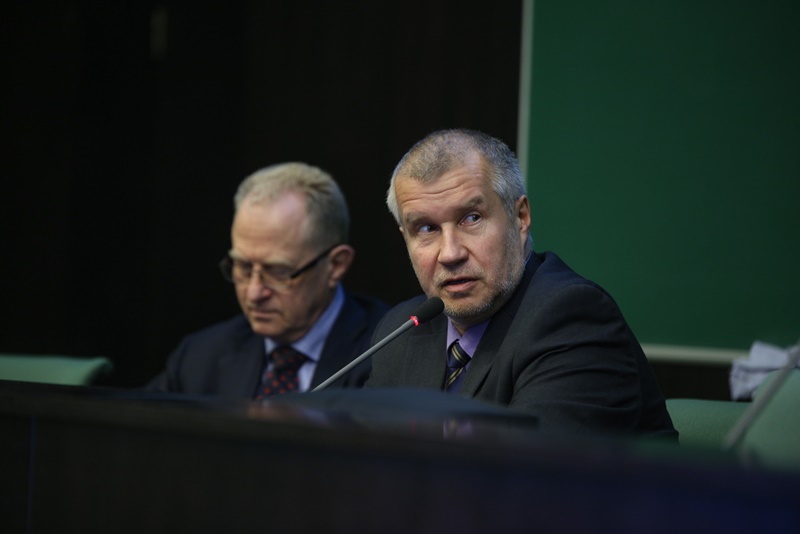
Prof. Oskars Kalējs at the RSU Scientific Conference, 17 March 2016
Why do you refer to RSU as the Castle of Light?
RSU is a university in the broadest and truest sense of the word. RSU teaches its students to think creatively and not only mechanically. This is where one acquires not only bare facts, but develops intellectually, forms a personality. The university teaches its students to take a more all-embracing view, instead of remaining a professional who does not see or know anything that is slightly to the right or left of the standard. A doctor must have the intellectual ability to see the world in a broader sense.
RSU is the university where I have studied and learnt a lot. Now I am giving back to my university. RSU has formed and developed and I am very glad that I have had the opportunity to contribute some bricks to this house.
Do you remember the supervisors of your thesis?
I was extremely lucky to work together with my best friend of all time, who was my classmate from the first day at school and who I sat next to me from Grade 7 onwards – Jānis Jirgensons. During my study years, he was my assistant, then he became a professor at RSU. Unfortunately, for 11 years now Jānis is teaching medicine in another dimension. I would also like to mention Jānis Skārds. Both supervised my research and have helped me to grow and develop.
I was educated on various heart disorders by assistant Juris Karpovs who is currently Associate Professor at the Department of Internal Diseases. Before and during my study years, I worked for the emergency services and now I'd like to take the opportunity to thank Dr. Georgs Glazunovs who taught me a lot. I can say that he is my first teacher in cardiology and I am extremely grateful to him for that.
What worries you in Latvian science today?
One of the biggest issues is the lack of funding. If we want to research something, we need funding. Just using a pen and a pencil will not result in huge scientific discoveries! Technologies, laboratories, laboratory equipment and staff are required. If a medical professional with a doctoral degree receives less than a supermarket packer or cashier, then what's the point? Some cannot accept this situation and quit working in research, which is a loss for the national research community in Latvia. Currently I have two projects! Fantastic! Both possible with the huge support from the Castle of Light. I call RSU the Castle of Light as RSU thinks about development, instead of spending resources without a strategic vision.
What would you consider as the most important scientific discovery in history?
If we're talking about medicine, there are three basic areas: asepsis and antisepsis, anaesthesiology and reanimatology as well as antibiotics. These three have revolutionised medicine! In the last few decades, most certainly, also genetics!
Please complete the sentence!
- I am Oskars Kalējs.
- I want to enjoy my time in this world for many decades!
- I do not want to become a burden or a hindrance.
- I am afraid of a having a stroke and war.
- I don't like people whining and complaining and doing nothing to improve the situation.
- For a million euro I would be ready to … I would try to bargain...maybe I can get more.
- To live well you must be an active and positive optimist.
Related news
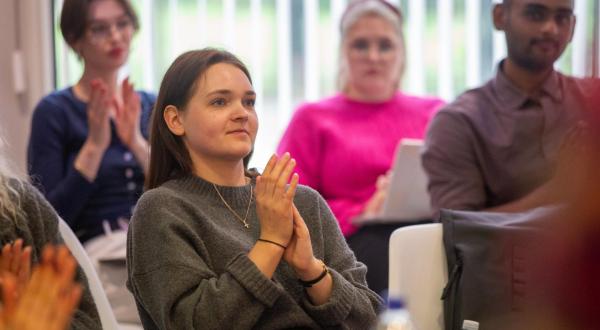 18 Student teams to start developing their ideas in B-Space incubation programmeFor RSU Employees, For Students, Innovation, B-Space
18 Student teams to start developing their ideas in B-Space incubation programmeFor RSU Employees, For Students, Innovation, B-Space


